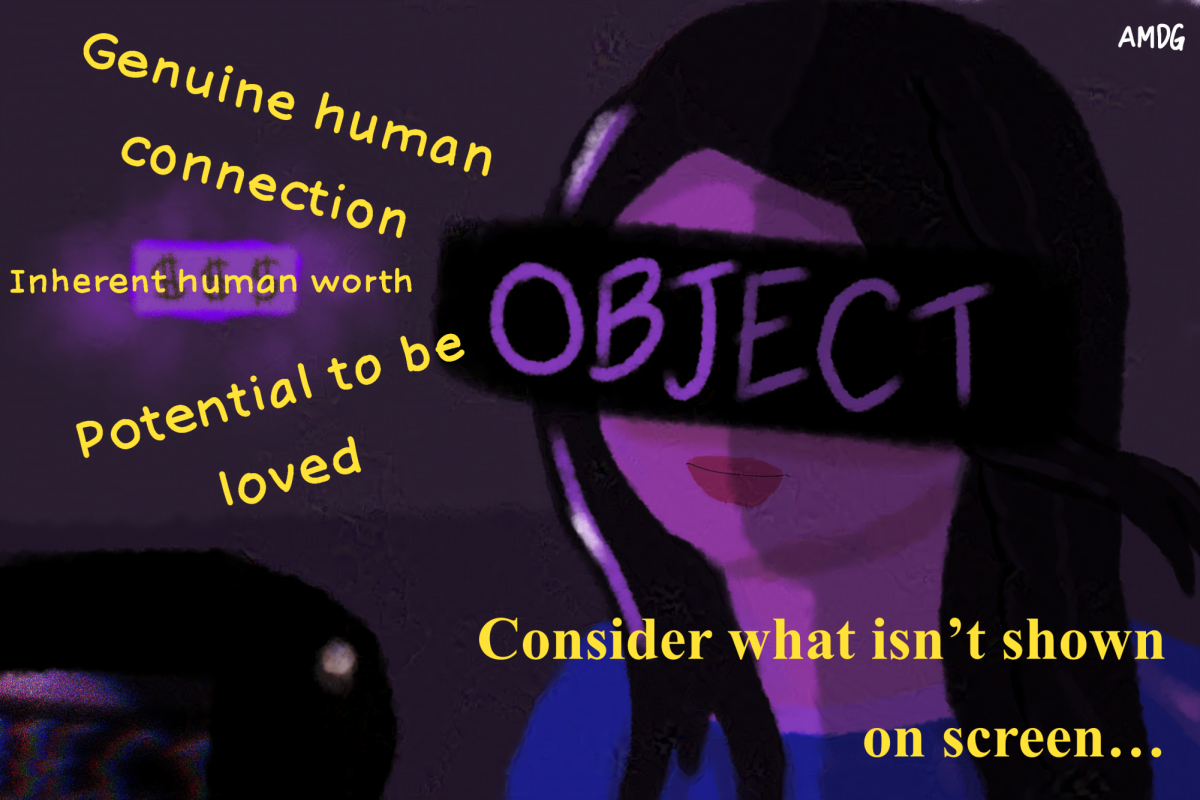Reconsider Pornography
January 18, 2023
The internet has been a great innovation in our modern society to share all sorts of videos: memes, sports clips, music, and clips of Anya from Spy x Family to list some of them. Most people can agree that the ability to distribute videos online can empower people by spreading a powerful message of action or by raising awareness of an injustice that has been ignored for too long. Many of the videos posted to the web are seen by some of its viewers to be useful and uplifting.
Likewise, a handful of people would even apply this endorsement of digital video as a means of social empowerment to pornography, videos that depict sexual activity. It appears to have allowed women in the U.S. to have another option as an occupation that they could find satisfaction with without the restrictive moral codes of American tradition. However, the production of pornography has ended up being damaging to the victims that are involved in both idea and practice. Despite the push by many well-meaning, pro-women progressives to encourage the production of pornographic content, the practice of creating pornography is one that should be boycotted for its perpetuation of social injustices.
Objectification
The dangers of pornography begin with it creating a fictional experience in the user’s mind. With porn being so readily available, this creates an escape for the user to enter into. Pornography allows its users the ability to view an unlimited supply of videos, and with each click, the user can be stimulated into having fictitious sexual relations with as many people as desired. This produces a cycle in which the user is drawn back for more, looking through the many options available, picking and choosing to feed the mind with which person looks the most attractive. Considering that men are four times as likely to be consuming pornography on a regular basis, this means that women are the ones being set up to be objectified. Eventually, this habit will follow the user into the real world, and they will only view possible partners subconsciously as objects. In addition to this, pornography uses digital technology to create a false view of sexual intercourse. Porn users will not view at women as people, but rather as sexual objects, and the user will have an increased standard due to the artificial content being viewed. It is no wonder that sexual harassment is becoming more and more prevalent. Every 68 seconds in the United States, someone is sexually assaulted, and over 80 percent of women have faced some sort of sexual harassment.
Reinforcement of Views of Dominance
Due to the porn industry’s objectification of women, porn appeals to the idea of superiority over women. Many pornographic films involve violence towards the women in the video. Acts such as rape and abuse are common genres in such pornographic material. The casual viewing of such violent content gives the audience a sense of supremacy over women, especially in terms of sexual gratification. According to a study on the link between pornography exposure and aggressive behavioral tendencies, exposure to violent pornography (e.g., rape imagery) can result in changes in men’s cognitive appraisals of sexual violence, according to social learning theory. Considering that a majority of young adult men view pornography at least once weekly, the effects of such films and their messages have concerning effects on society.
False Identities
In addition to these ideological injustices, pornographic media creates a false identity of the people in the films in the eyes of the viewer. Former pornography actress Mia Khalifa left the industry after just three months, but there might be few people on Earth who are aware of this fact. This is not surprising, given the internet’s ability to solidify anything posted online into permanency through digital storage and users’ tendency to bring up information even if it appears to have been removed from the web. She has been the subject of internet memes and discussions that continue despite Khalifa’s retraction from the industry. Offline, she had been recognized by many in public only for her production of pornography. Her identity was defined by the society around her based on these three months in the industry.
Khalifia’s experience with working in the industry and having a permanent record of a part of her life she regrets is nothing unique. Former victims of pornographic abuse like Bree Olson, Lana Rhoades, and then-14-year-old Rose Kalemba have had videos that have been perpetuated after their absolute protest of the pornographic material created of them. Yet people continued to prolong the memory of their regrets due to the permanency of their pornographic material, associating these women with their past. Pornography turns these memories into an inaccurate identity perceived by the audience of the videos. Consumers define the people featured in these films by their sexual activity or body, ignoring other factors that make up their characters such as personalities, personal struggles and successes, and their interests and hobbies. As a progressive society that strives to recognize the full personhood of fellow human beings, pornography should be left in the past along with the false identities that it creates.
How to Respond
The pornography industry is such a large and encapsulating industry that it will most likely not end soon. However, it is of dire importance to boycott the consumption and exposure of such material as it objectifies people, creates toxic mindsets towards them, and dehumanizes its workers, all of which are targeted towards women specifically. Quit porn, love more.





